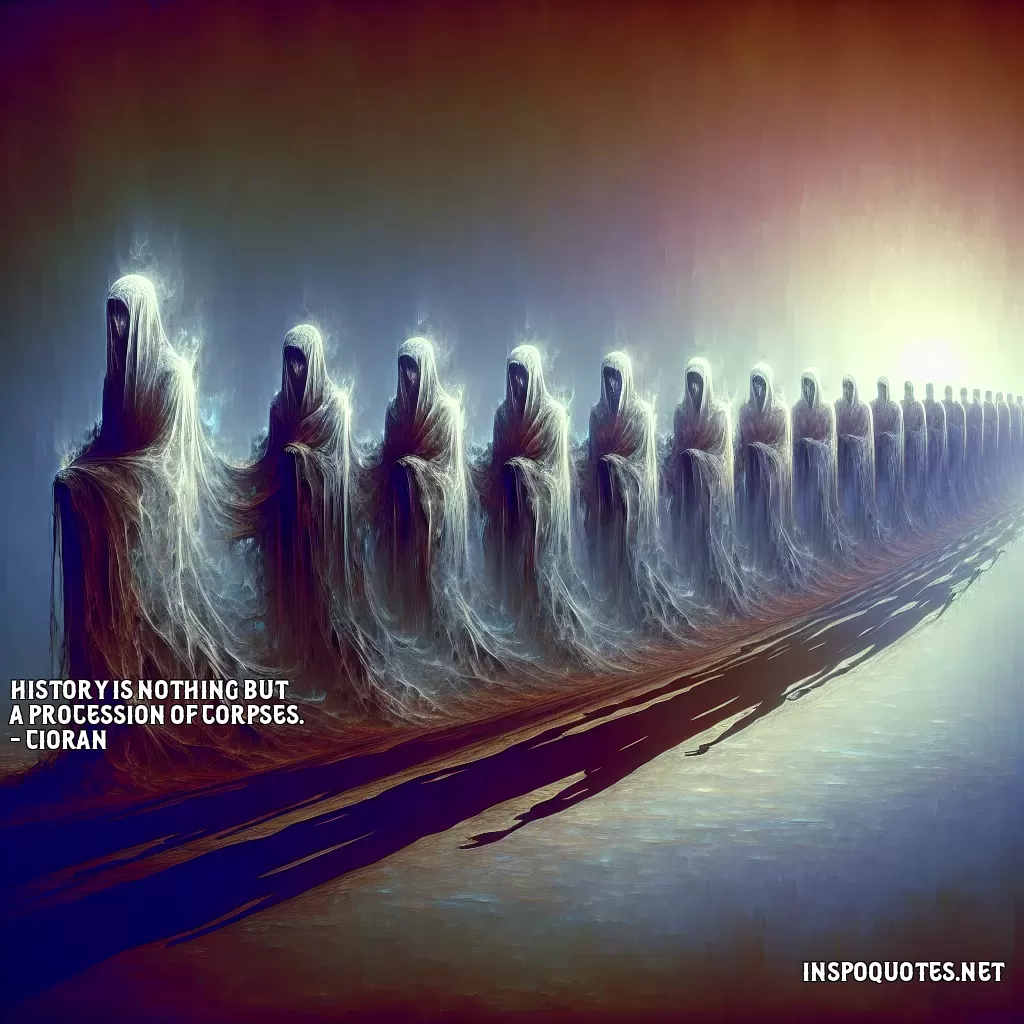
History is nothing but a procession of corpses. - Cioran
Author: Cioran
👁️ 17 views
Emil Cioran, a Romanian philosopher known for his pessimistic and existentialist outlooks, offers a stark view of history with the quote "History is nothing but a procession of corpses." This perspective suggests that history is fundamentally shaped by death and the suffering of individuals throughout time. His choice of the word "procession" implies a continuous, almost ceremonial line of events marked primarily by mortality and the passage from life to death. In essence, Cioran's statement underscores how history, often celebrated for its achievements in culture, technology, and governance, is equally defined by its darker aspects – namely, violence, war, and the loss of human life. Historical events such as wars, revolutions, and even the build-up of empires have often resulted in significant loss of life. Cioran posits that these deaths are not just incidental but integral to what we understand as history itself. Moreover, his quote can be seen as a critique of how history is recorded and remembered. It questions the tendency to highlight triumphs and progress while glossing over the human cost involved. Cioran, through his philosophical lens, invites reflection on the macabre and transient nature of human achievements. This existential viewpoint encourages a deeper consideration of the value of life and the inevitable march towards death that every historical narrative encases. By viewing history as a "procession of corpses," Cioran challenges us to confront the often neglected atrocities and sacrifices that accompany historical progress. His perspective asks for a more sobering acknowledgment of how our past is interwoven with the inevitability of death, encouraging a reevaluation of the human condition itself and our understanding of progress.
Quote By: Cioran
Emil Cioran, born on April 8, 1911, in Rășinari, Romania, was a profound philosopher and essayist renowned for his bleak and often unsettling insights into the human condition. Known for his mastery of language and unique philosophical perspective, Cioran's work revolves around themes of existential despair, nihilism, and the contradictions of existence. His early life in Romania was marked by a deep engagement with literature and philosophy, which he later intertwined with his own experiences and reflections.
Cioran studied philosophy at the University of Bucharest, where he was influenced by figures such as Nae Ionescu and other Romanian intellectuals. His early writings, composed in Romanian, include notable works such as "On the Heights of Despair" (1934), which established him as a distinct voice in Romanian literature. In these texts, Cioran examined the paradoxes of life and expressed a profound sense of disillusionment with both society and the self. His philosophical inquiries delved into the nature of suffering and the arbitrary nature of existence, foreshadowing his later writings.
In 1937, Emil Cioran moved to France, where he continued to write, eventually adopting French as his primary language. His subsequent works, including "The Trouble with Being Born" (1973) and "A Short History of Decay" (1949), reflect a deep existential malaise and a strikingly poetic, albeit dark, style. Cioran's ability to articulate the depths of human despair resonated with readers, and his writing garnered significant acclaim in both literary and philosophical circles.
Despite his often bleak outlook, Emil Cioran's writings have had a lasting impact, influencing generations of thinkers and writers. He was not just a philosopher of despair but also a stylist concerned with the beauty and rhythm of language. Cioran's legacy lies in his ability to confront the abyss without flinching, inviting readers to engage with the profound uncertainties of life. He passed away on June 20, 1995, in Paris, leaving behind a body of work that continues to provoke thought and inspire debate in the realms of philosophy and literature.